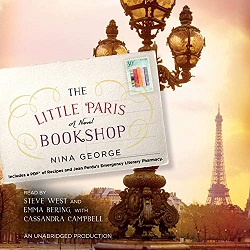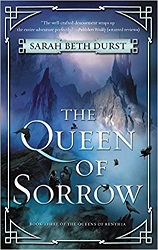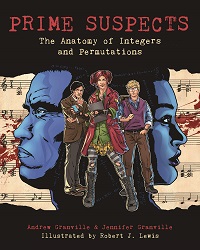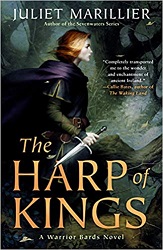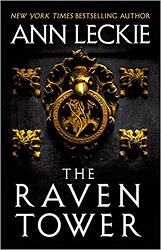Review of The Little Paris Bookshop, by Nina George, read by Steve West
by Nina George
read by Steve West
and Emma Bering, with Cassandra Campbell
Random House Audio, 2015. 10 hours and 55 minutes.
Review written May 19, 2020, based on a library eaudiobook
Starred Review
This audiobook is amazing! It’s the first eaudiobook I’ve ever listened to. Since I’m not driving in my car much while teleworking during the Covid-19 crisis with the library closed, and don’t have much occasion to listen to CDs, and since library customers will be accessing ebooks more than ever, so I should know how it’s done – I decided to install the Libby app on my phone and check out an eaudiobook.
I chose the book by doing a search for my favorite narrator, Steve West. And this ended up being a wonderful choice! Yes, his dreamy voice was perfect for this book. He did French accents throughout, while narrating in his wonderful British accent. At the start of the book, the main character will not say or even think the name of his ex-lover, and Steve West did a perfect sigh to indicate the missing name. When he did start saying the name, all the love in his voice was palpable.
But let me talk about the story. The book features Jean Perdu, a bookseller in Paris whose shop is a barge on the River Seine. He calls himself a literary apothecary, because he has an almost magical ability to see into someone’s soul and know the book that will be just right for them. He’s working on an Encyclopedia of Small Emotions — all the little feelings that come over you in different situations.
But his own emotions are kept strictly walled up. As the book opens Perdu’s landlady asks him to give a table to the distraught woman who has recently moved into their building, after being left by her famous husband. Perdu does have a table to give her – but it is in a room he has hidden behind a bookcase and not entered for 21 years.
When the door is opened, some old emotions come flooding back into Perdu’s life. Then as his defenses crack, the new neighbor, Katharine, finds an unopened letter when she’s looking for a corkscrew in a painted-over drawer in Jean’s kitchen. When he finally reads the 21-year-old letter, everything he thought about why his former lover left him turns out to be wrong.
That’s all at the beginning of the book. Jean Perdu ends up on not a road trip but a river trip. He unmoors his book barge and sets off to the south of France, the home of his lost love. Along the way, he gains as travel companions a wildly successful and eccentric young debut novelist with writer’s block and an Italian chef looking for his own lost love.
Along the way, Perdu explores his memories, memories he’d tried to hide from. And he writes letters to Katharine, who poked cracks into his walls. And the travel companions have adventures that bond them to each other.
The book is a wonderfully warm story, never traveling expected paths, but so full of heart, and so full of thoughts about love and about life itself. All read with the amazing rich voice of an outstanding audiobook narrator, this story has resonance that will leave you thinking about it long after the sound has been turned off.
Find this review on Sonderbooks at: www.sonderbooks.com/Fiction/little_paris_bookshop.html
Disclosure: I am an Amazon Affiliate, and will earn a small percentage if you order a book on Amazon after clicking through from my site.
Source: This review is based on a library eaudiobook from Fairfax County Public Library.
Disclaimer: I am a professional librarian, but the views expressed are solely my own, and in no way represent the official views of my employer or of any committee or group of which I am part.
What did you think of this book?
